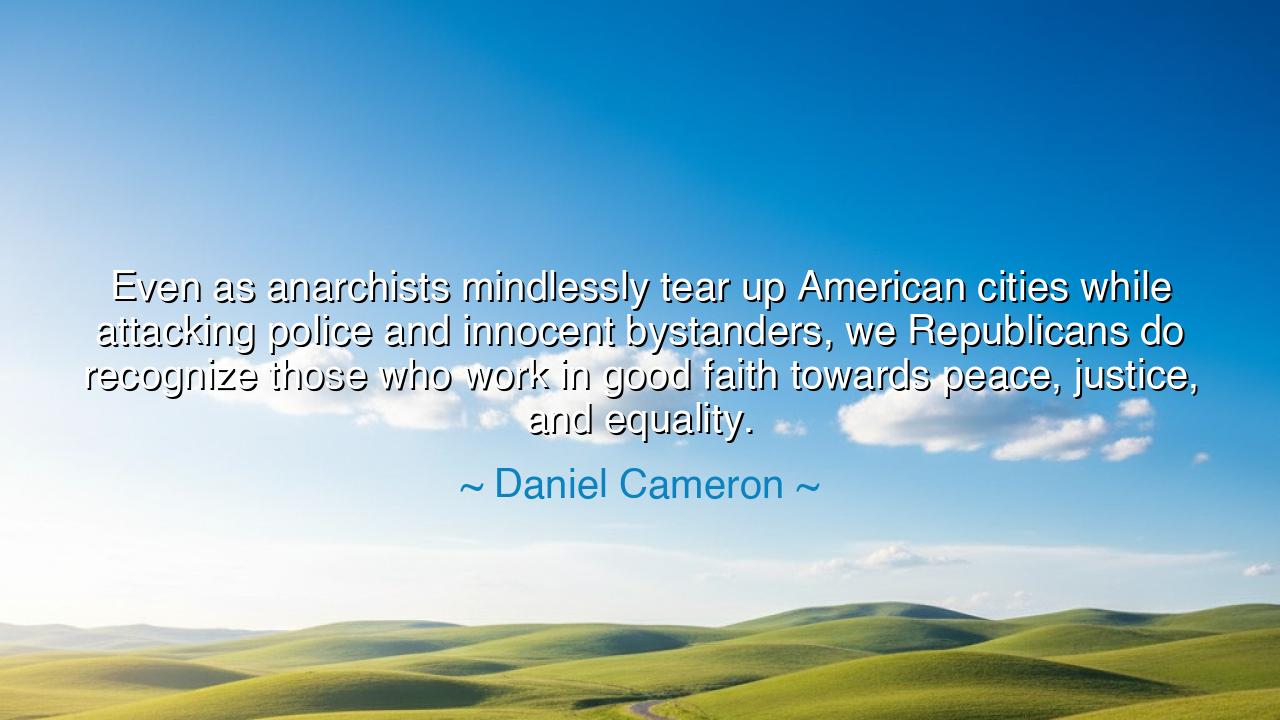
Even as anarchists mindlessly tear up American cities while
Even as anarchists mindlessly tear up American cities while attacking police and innocent bystanders, we Republicans do recognize those who work in good faith towards peace, justice, and equality.






In the vast unfolding story of humanity, few conflicts are as intense, as fraught with emotion, as the battle between order and chaos. Across the ages, societies have been tested by those who seek to tear down the structures that bind them, and by those who strive to build a foundation of justice, peace, and equality. The words of Daniel Cameron, "Even as anarchists mindlessly tear up American cities while attacking police and innocent bystanders, we Republicans do recognize those who work in good faith towards peace, justice, and equality," speak to the heart of this struggle, a call to distinguish between the forces that seek destruction and those that seek constructive change.
The ancients understood well the importance of order. In Ancient Greece, the philosopher Plato spoke of the need for a just society governed by reason, where citizens upheld their duties not out of fear, but out of a shared commitment to the common good. He saw in the ideal state a harmonious balance between individual liberty and the greater good of the community. Similarly, Aristotle warned against the chaos that could arise when a society’s moral fabric weakened, when people forsook their shared sense of purpose for self-interest and anarchy. In both of these ancient visions, there was a clear recognition that the pursuit of peace and justice could never be achieved through disorder, but only through deliberate and reasoned action.
Daniel Cameron's words speak directly to this ancient wisdom. He acknowledges the chaos, the violence, and the disorder that have marred modern cities in the name of protest. In a world that often seems to teeter on the edge of turmoil, his call is a reminder that true justice and equality must be pursued with a sense of discipline and honor, not through reckless destruction. The forces of anarchy—those who would tear down the very foundations of society—are not the ones who can create a better world. They are, in a sense, the enemies of order, and their actions undermine the very ideals they claim to defend.
In contrast, history teaches us that those who have brought about lasting change were often those who worked within the system, who pursued justice through the channels of law, reason, and peaceful action. Consider the example of Mahatma Gandhi, who, through nonviolent resistance, led the Indian independence movement against British colonial rule. Gandhi did not seek to destroy, but rather to rebuild society upon the foundations of truth and justice. His marches, his fasts, and his unwavering commitment to peaceful resistance stand in stark contrast to the chaotic violence that often erupts in the name of change. His example reminds us that peace and equality can only be achieved through dedication to nonviolent means, through a commitment to working within the system, not destroying it.
There is a great lesson in the words of Cameron for those who seek change. The chaos that we witness in the streets, the violence that tears at the very fabric of society, are not the solutions to the inequities that many rightly feel. They are, in fact, the perpetuation of a cycle of destruction that leads only to further suffering and division. True progress comes not from the force of rage, but from the quiet strength of those who work with resolve and wisdom towards the common good. It is in the disciplined pursuit of justice, through dialogue, through legislation, and through peaceful activism, that lasting change can be achieved.
The words of Cameron are a call for all of us to recognize the difference between those who would destroy and those who would build. It is easy to be swept up in the fervor of emotion, to feel the pull of anger and frustration, especially in a world where inequality still exists. But we must ask ourselves: what kind of world do we wish to build? Do we want a world of perpetual chaos and violence, or one in which peace and justice can flourish through collective effort and reasoned action? The path of order and peace is not the easiest, but it is the path that leads to true freedom and equality for all.
As we move forward in our own lives, let us remember the ancient wisdom of those who sought to build societies founded on reason, justice, and peace. Let us take action not through anger and destruction, but through the strength of our convictions, the discipline of our efforts, and the wisdom of those who came before us. In this way, we will honor the true meaning of justice and equality, and build a world that reflects the highest ideals of peace and shared humanity.






AAdministratorAdministrator
Welcome, honored guests. Please leave a comment, we will respond soon